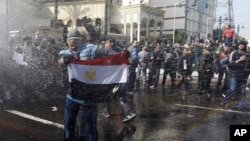Violent protest spread across Cairo and other Egyptian cities on Friday as tens of thousands of demonstrators intensified their campaign to oust President Hosni Mubarak. The government has also announced a curfew until Saturday morning.
People were pouring into the streets of Cairo from mosques after midday prayers, clashing with police who fired tear gas and rubber bullets.
Police also fired water cannons at one of the country's leading pro-democracy advocates, Mohamed ElBaradei, and his supporters as they joined the latest wave of protests. The Associated Press reports that ElBaradei has been placed under house arrest. Earlier ElBaradei sounded defiant as he said the Mubarak regime must listen.
"[I'm]calling, and I'll continue to call on the regime, that they have to listen to the people and initiate immediately a process of change," ElBaradei said.
The former head of the nuclear watchdog, The International Atomic Energy Agency, and a Nobel peace laureate returned to Cairo on Thursday and is promising to join the protests that have so far been propelled by young people.
Slideshow of Egypt Protests
Smaller protests also took place in Assiut south of Cairo and al-Arish in the Sinai peninsula. There were news reports of clashes with police in the port city of Alexandria and Minya.
|
Key Players in Egypt's Crisis
|
Internet and cell phone connections have been disrupted or restricted in Cairo, Alexandria and other places, cutting off social media Web sites that had been used to organize protests and complicating efforts by news media to report on events on the ground. Some reports said journalists had been singled out by police who used batons to beat and charge protesters.
Wael Ibrahim, a local resident in Cairo, is one of a crowd of thousands. He says he is tired of the country's financial woes.
"The average Egyptian is suffering from low wages," Wael said. "All we want is a solution to this, it's not a question of removing Hosni [Mubarak] from power, we want a solution."
But others seemed less sympathetic toward the current administration. News reports show protesters in Al Azhar in old Cairo, chanting "The people want to bring down the regime!"
ElBaradei recently wrote on his Twitter site: "The writing is on the wall. Hope regime gets it: change cannot wait."
One cell phone operator, Vodafone, said Friday that Egypt had told all mobile operators to suspend services in selected areas of the country. The British company said it would comply with the order, Reuters reported.
President Mubarak, 82, has been in office since 1981.
The Egyptian government tolerates little dissent and opposition demonstrations are routinely outlawed.
On Thursday, Mr. Mubarak's National Democratic Party, NDP, said it was ready for dialogue but did not offer any concessions.
The U.S. government, which counts Egypt as one of its most important allies in the Arab world, has so far been cautious in expressing support for either side.
President Barack Obama described the protests as the result of "pent-up frustrations", saying he had frequently pressed Mr. Mubarak to enact reforms. He urged both sides not to resort to violence.
US Secretary of State Hillary Clinton's statement on Egypt protests




